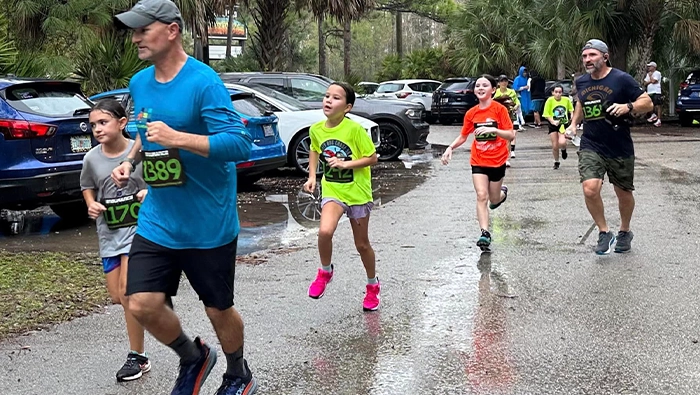
How to plan a prosperous race fundraiser
A Kiwanis club in Florida, U.S., has held a 5K run for 16 years. Their tips can help you meet your fundraising mark.
By Julie Saetre
In January 2024, the Fort Myers Metro-McGregor Kiwanis Club held its 16th annual BUG Chase 5K run. Nearly 300 enthusiastic participants raced along trails at a local nature center, helping the club raise over US$12,000.
Proceeds from the race benefit the club’s Bringing Up Grades program at three local elementary schools as well as other club-sponsored youth service projects.
At the helm of this successful effort was Rachel Toomey, the BUG Chase chair and the club’s public relations chair.
“Rachel is results-driven,” says Kim Berghs, the club’s secretary and a BUG Chase team member, “and extremely organized.”
While the race itself and its financial results are impressive, the long hours and hard work behind the scenes by Toomey and her dedicated team are just as significant. Their combined experience makes these Kiwanians ideal resources for other clubs hoping to replicate results by starting their own fundraising runs. Below, Toomey and Berghs offered a primer on organizing a race and/or walk, from initial planning to effective follow-up.
Prerace planning
- Start early. Give yourself a minimum of at least six months to prepare.
- Designate a director. Make sure that person has a team of support volunteers.
- Delegate duties. Create a shared Google Doc or similar folder and give key volunteers access so they can store information, enter updates and cross reference details. This avoids an endless stream of easily misplaced emails.
- Pick a date wisely. Research other walks and races in your area so your target participants don’t have to choose between your event and others.
- Recruit sponsors. Create an attractive sponsorship packet with detailed benefits and deadlines. Ask a club member to take charge of sponsorships.
Member engagement
- Identify which members can volunteer on race day. Assign pre- or post-race tasks to members who can’t attend the event.
- Call on your Service Leadership Program members to volunteer on race day. With a large event, you’ll need many hands to help.
- Make sure race-day volunteers are assigned tasks that they can comfortably complete at their mobility, skill and ability levels.
Support services
- Work with a professional race-timing company. Different timing companies offer different services. Get two or three quotes and compare details to find a company that best fits your needs and budget.
- Look into race software such as RunSignup to handle registration, check in runners and post results.
- Select a vendor for race shirts and awards. Make sure to get deadlines for orders and schedule those into your timeline.
- Ask your community partners and the schools/organizations sponsoring your Service Leadership Programs to help you promote the race. Let them know how they will benefit from race funds raised.
- Reach out to coaches of running clubs and track teams at local schools. “Over half of our race registrants this year were from local run clubs,” Toomey says.
Race day necessities
- Ask local law enforcement or safety officers to help with traffic control. This might come with a fee, so budget accordingly.
- Recruit on-the-ground safety assistance. The Metro-McGregor BUG Chase team fills out a request form each year to ask for volunteers to help with safe pedestrian crossing from the parking area to the registration and race-start locations.
- Request donations from local companies (grocery stores, restaurants, convenience stores, etc.) for race-day food and water; be sure to recognize them as in-kind sponsors.
- Be flexible. With so many moving parts — literally and figuratively — a lot of items will be out of your control. “Roll with the punches,” Toomey says, “and lean on your Kiwanis members for help.”
Post-race follow-up
- Ask for feedback. Toomey sends a post-event survey to all runners, sponsors and other participants. Included are links to race results, event photos and business sponsors. “I forward that email to all club members (some were also participants) so they can see the nice recap and access the same information,” Berghs says.
- Thank sponsors. Two club members send out personal letters of thanks to sponsors and in-kind sponsors. “Included in each letter is an actual thank-you letter or two from children in some of the elementary schools where we do a WorldAtlas distribution,” Berghs says. “That way the sponsor can see firsthand one of our club projects from the eyes of a child.”


